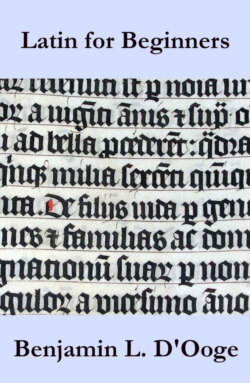Читать книгу Latin for Beginners - BENJAMIN L. D’OOGE - Страница 53
На сайте Литреса книга снята с продажи.
«99.» EXERCISES
ОглавлениеFirst learn the special vocabulary, p. 286.
I. 1. Mārcus amīcō Sextō cōnsilium suum nūntiat 2. Est cōpia frūmentī in agrīs nostrīs. 3. Amīcī meī bonam cēnam ancillae vestrae laudant 4. Tua lōrīca, mī fīlī, est dūra. 5. Scūta nostra et tēla, mī amīce, in castrls Rōmānīs sunt. 6. Suntne virī patriae tuae līberī? Sunt. 7. Ubi, Cornēlī, est tua galea pulchra? 8. Mea galea, Sexte, est in casā meā. 9. Pīlum longum est tuum, sed gladius est meus. 10. Iūlia gallīnās suās pulchrās amat et gallīnae dominam suam amant. 11. Nostra castra sunt vestra. 12. Est cōpia praedae in castrīs vestrīs. 13. Amīcī tuī miserīs et aegrīs cibum et pecūniam saepe dant.
II. 1. Our teacher praises Mark’s industry. 2. My son Sextus is carrying his booty to the Roman camp.[1] 3. Your good girls are giving aid to the sick and wretched.[2] 4. There are [3] frequent battles in our villages. 5. My son, where is the lieutenant’s food? 6. The camp is mine, but the weapons are yours.
[Footnote 1: Not the dative. Why?]
[Footnote 2: Here the adjectives sick and wretched are used like nouns.]
[Footnote 3: Where should «sunt» stand? Cf. I. 2 above.]
[Illustration: AGRICOLA ARAT]
